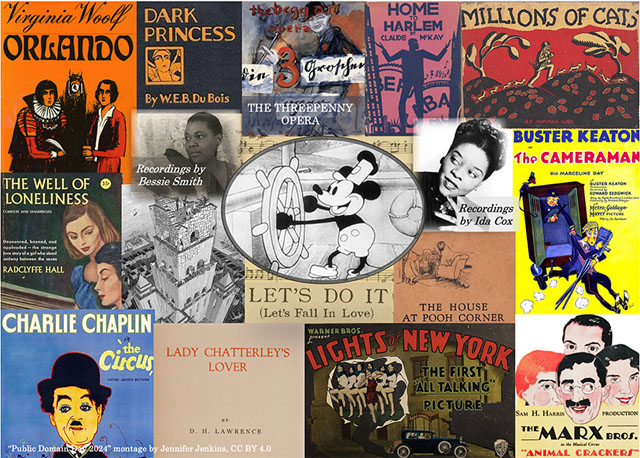米国では、1928年に米国で発行された著作物の著作権の保護期間が2023年末を持って失効。2024年1月1日からパブリックドメイン(共有財産)となりました。米デューク大学パブリックドメイン研究センターは、新たにパブリックドメインに登録された著作物(文学、映画、音楽作品)を紹介しています。映画はディズニーの短編映画『蒸気船ウィリー』やバスター・キートンの『キートンのカメラマン』など、音楽はコール・ポーターの「Let's Do It, Let's Fall in Love」やルイ・アームストロング「Beau Koo Jack」など。なお、同センターで紹介されているのは、あくまでも米国での話で、著作権保護は国によって異なります。
米国では1998年に米国著作権法が改正され、それまで“発表後75年”に定められていた著作権保護期間が“発表後95年”に延期。今回パブリックドメインとなった作品は、もともと2004年にパブリックドメインになる予定でしたが、20年延期され、2024年1月1日からパブリックドメインとなっています。
また米国では音楽の録音物の著作権については別の法律があります。2022年、音楽近代化法という新しい法律の下、1922年末までに録音された音源はパブリックドメインとなりました。そして2024年、新たに1923年の録音もパブリックドメインとなりました。
■音楽
※パブリックドメインになるのは、楽譜に書かれているような楽曲と歌詞だけで、レコーディングされた楽曲は別個の著作権で保護されています。
●Animal Crackers (musical starring the Marx Brothers; book by George S. Kaufman and Morrie Ryskind and lyrics and music by Bert Kalmar and Harry Ruby)
●Mack the Knife (original German lyrics by Bertolt Brecht and music by Kurt Weill; from The Threepenny Opera)
Let’s Do It (Let’s Fall in Love) (Cole Porter; from the musical Paris)
●Sonny Boy (George Gard DeSylva, Lew Brown & Ray Henderson; from the film The Singing Fool starring Al Jolson)
When You're Smiling (lyrics by Mark Fisher and Joe Goodwin and music by Larry Shay)
●Empty Bed Blues (J. C. Johnson)
●I Wanna Be Loved By You (lyrics by Bert Kalmar and music by Herbert Stothart and Harry Ruby; from the musical Good Boy)
●Makin’ Whoopee! (lyrics by Gus Khan and music by Walter Donaldson)
●You’re My Necessity, You’re The Cream in My Coffee (George Gard DeSylva, Lew Brown & Ray Henderson; from the musical Hold Everything!)
●I Can’t Give You Anything But Love, Baby (lyrics by Dorothy Fields and music by James Francis)
●Ramona (lyrics by L. Wolfe Gilbert and music by Mabel Wayne)
●There’s a Rainbow ‘Round My Shoulder (Al Jolson, Billy Rose, Dave
●Dreyer; from the film The Singing Fool)
●Beau Koo Jack (lyrics by Walter Melrose and music by Alex Hill and Louis Armstrong)
●Pick Pocket Blues (Bessie Smith)
■1923年の録音
●Charleston (recorded by James P. Johnson)
●Yes! We Have No Bananas (recorded by Billy Jones; Furman and Nash; Eddie Cantor; Belle Baker; The Lanin Orchestra)
●Who’s Sorry Now (recorded by Lewis James; The Happy Six; the Original Memphis Five)
●Down Hearted Blues (recorded by Bessie Smith; Tennessee Ten)
●Lawdy, Lawdy Blues (recorded by Ida Cox)
●Southern Blues and Moonshine Blues (recorded by Ma Rainey)
●Down South Blues (recorded by Hannah Sylvester; The Virginians)
●Wolverine Blues (recorded by the Benson Orchestra of Chicago)
●Tin Roof Blues (recorded by the New Orleans Rhythm Kings)
●That American Boy of Mine and Parade of the Wooden Soldiers (recorded by Paul Whiteman and his Orchestra)
●Dipper Mouth Blues and Froggie More (recorded by King Oliver’s Creole Jazz Band, featuring Louis Armstrong)
●Bambalina (recorded by the Ray Miller Orchestra)
●Swingin’ Down the Lane (recorded by the Isham Jones Orchestra; The Shannon Four; The Columbians)
■映画
●Steamboat Willie and Plane Crazy (the silent version) (directed by Walt Disney and Ub Iwerks) [5]
●The Cameraman (directed by Edward Sedgwick and Buster Keaton)
Lights of New York (directed by Bryan Foy; billed as “the first ‘all-talking’ picture”)
●The Circus (directed by Charlie Chaplin)
●The Passion of Joan of Arc (directed by Carl Theodor Dreyer)
●The Singing Fool (directed by Lloyd Bacon; follow-up to The Jazz Singer)
●Speedy (directed by Ted Wilde; Harold Lloyd’s last silent theatrical release)
●In Old Arizona (“100% all talking” film featuring singing cowboys)
●The Man Who Laughs (directed by Paul Leni; features a character who inspired the appearance of the Joker from Batman)
●Should Married Men Go Home? (directed by Leo McCarey and James Parrott; the first Laurel and Hardy film to bill them as a team)
●The Wind (directed by Victor Sjöström)
●The Wedding March (directed by Erich von Stroheim)
●The Crowd (directed by King Vidor)
●The Last Command (directed by Josef von Sternberg; Emil Jannings won
the first Academy Award for Best Actor)
●Street Angel (directed by Frank Borzage; Janet Gaynor won the first Academy Award for Best Actress)
■本&脚本
●D.H Lawrence, Lady Chatterley's Lover
●Bertolt Brecht, The Threepenny Opera (in the original German, Die Dreigroschenoper)
●Virginia Woolf, Orlando
●Erich Maria Remarque, All Quiet on the Western Front (in the original German, Im Westen nichts Neues)
●W.E.B. Du Bois, Dark Princess
●Claude McKay, Home to Harlem
●A. A. Milne, illustrations by E. H. Shepard, House at Pooh Corner (introducing the Tigger character)
●J. M. Barrie, Peter Pan; or the Boy Who Wouldn't Grow Up (because it was not "published" for copyright purposes until 1928)
●Radclyffe Hall, The Well of Loneliness
●Evelyn Waugh,Decline and Fall
●Agatha Christie, The Mystery of the Blue Train
●Wanda Gág, Millions of Cats (the oldest American picture book still in print)
●Robert Frost, West-Running Brook
●Ben Hecht and Charles MacArthur, The Front Page
詳細は以下のURLのページでご覧になれます。
https://web.law.duke.edu/cspd/publicdomainday/2024/
